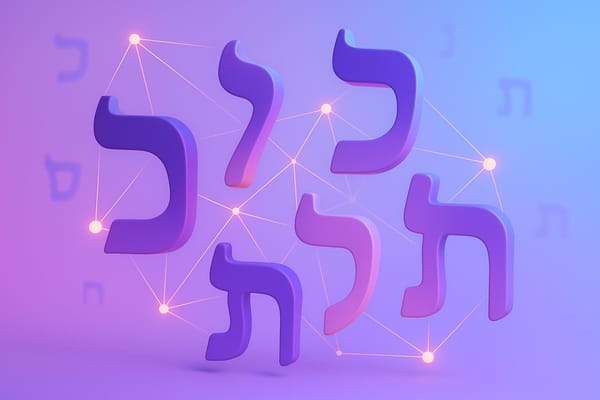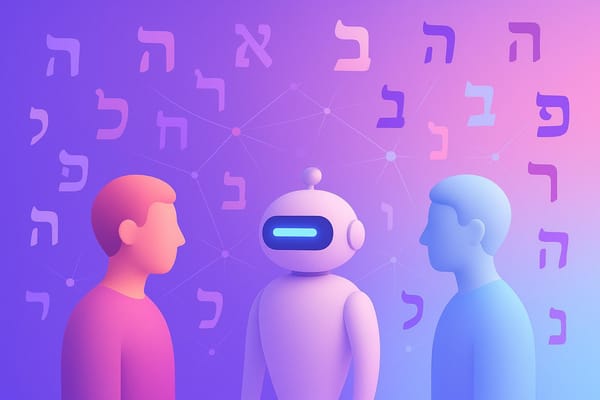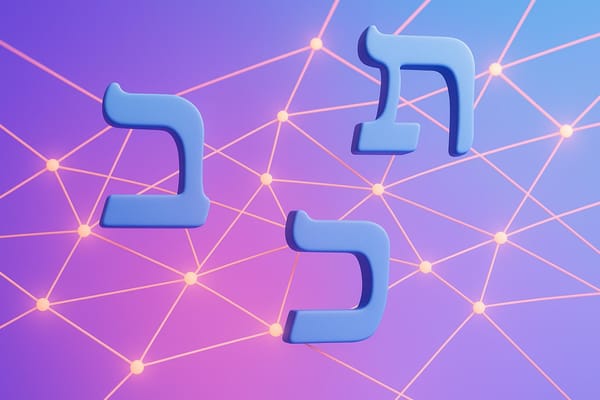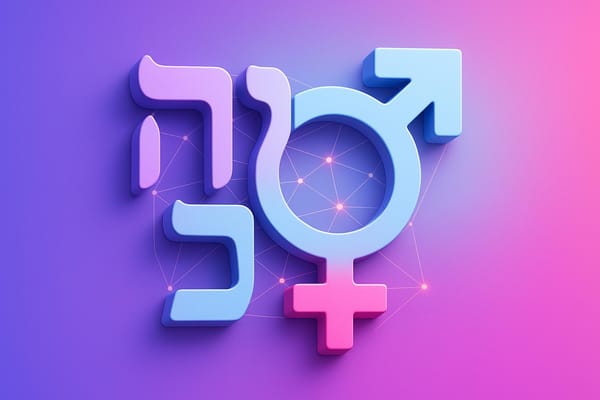Eliezer Ben-Yehuda's Role in Hebrew Revival
Explore how one individual's vision revived Hebrew from a dormant language to a vibrant means of daily communication, shaping a national identity.
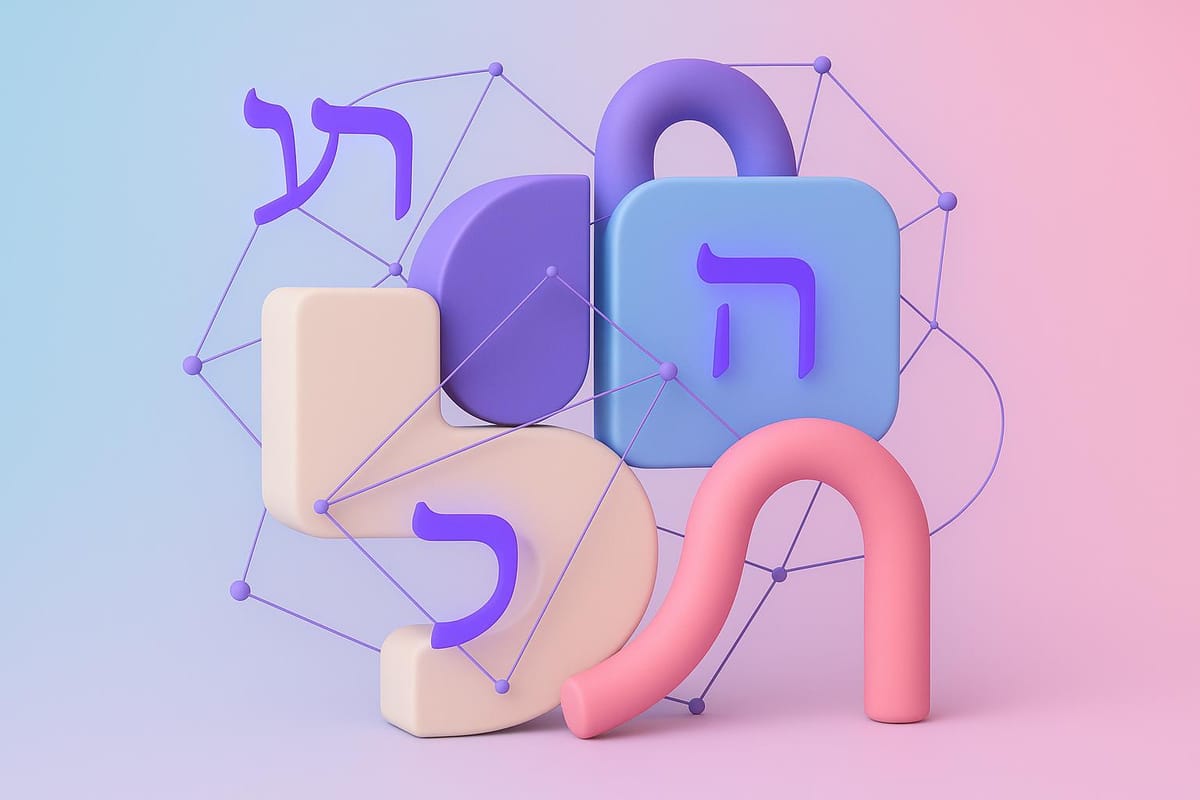
Before you dive in, check out baba — our context-aware Hebrew translation app for iOS and Android. Baba understands who you are and who you’re talking to, handles slang, gender, and plurality, and delivers natural Hebrew every time.
Eliezer Ben-Yehuda is often called the "father of modern Hebrew" for his pivotal role in transforming Hebrew from a dormant religious language into a vibrant, spoken one. For nearly 1,800 years, Hebrew was used primarily in religious contexts, but Ben-Yehuda’s efforts in the late 19th and early 20th centuries helped establish it as a living language for everyday life. His work included creating thousands of new words, promoting Hebrew in schools and homes, and even raising his own son as the first native speaker of modern Hebrew.
Key challenges he faced included:
- Linguistic diversity among Jewish immigrants (Yiddish, Ladino, Arabic, etc.).
- Resistance from religious leaders who viewed secular use of Hebrew as sacrilegious.
- Political opposition from the Ottoman authorities.
Ben-Yehuda’s achievements:
- Expanded Hebrew’s vocabulary to include modern concepts like "bicycle" (ofanayim) and "electricity" (khashmal).
- Founded organizations to promote Hebrew education and usage.
- Published a comprehensive Hebrew dictionary, which remains influential today.
The Revival of Modern Hebrew
Major Obstacles in Hebrew Language Revival
As Ben-Yehuda worked tirelessly to modernize Hebrew, he encountered a range of challenges that tested his determination and ingenuity. These obstacles spanned linguistic, cultural, religious, and political realms, each demanding creative solutions and unwavering persistence.
Multiple Languages in Jewish Communities
Jewish immigrants brought with them a rich tapestry of languages. Ashkenazi Jews spoke Yiddish, Sephardic Jews used Ladino, Mizrahi Jews communicated in Arabic, and many retained Russian, German, or other native tongues. This linguistic diversity made it incredibly difficult to establish Hebrew as a unifying language. By 1879, while over half of all male Jews could understand the Pentateuch and daily prayers, only about 20% could read a Hebrew book of average complexity. Many found it easier to rely on their familiar languages, making the adoption of Hebrew for everyday life an uphill battle. This diversity became a significant hurdle in creating a cohesive community grounded in modern Hebrew.
Opposition from Religious Groups and Government
Resistance to Ben-Yehuda’s efforts came from both religious leaders and political authorities. Orthodox rabbis, in particular, objected to the use of Hebrew outside its traditional sacred context. For them, Hebrew was a holy language meant exclusively for prayer and religious study, and using it for secular purposes was considered blasphemous. Tensions escalated when Ben-Yehuda openly criticized rabbinical rulings on the Sabbatical year, leading to his excommunication. Orthodox communities were urged to boycott his newspaper, further isolating him and his work.
On the political front, the Ottoman authorities viewed the revival of Hebrew as a potential nationalist threat. In December 1893, Ben-Yehuda and his father-in-law were arrested in Jerusalem after he published an article containing the phrase "let us gather strength and go forth." This arrest underscored the political risks of his mission. He was eventually released thanks to bribery and international pressure, but the incident highlighted the dangers he faced in pursuing his vision.
Missing Words for Modern Life
One of the most pressing challenges was the lack of vocabulary to describe modern concepts. Hebrew, after nearly two thousand years of being primarily used for religious and scholarly purposes, lacked words for everyday items and innovations like newspapers, bicycles, electricity, and airplanes.
Ben-Yehuda tackled this issue head-on, working tirelessly to expand Hebrew’s lexicon. He drew inspiration from Biblical and Rabbinical texts, borrowed terms from contemporary Arabic, and created compound words to fill the gaps. Some of his inventions include ofanayim (bicycle) from the ancient word ofan (wheel), mishkafayim (glasses) from roots meaning "to look through", and khashmal (electricity), adapted from the Biblical term for amber. These efforts not only addressed immediate linguistic needs but also laid the groundwork for Hebrew to grow and adapt as a modern language, capable of keeping pace with societal changes.
Ben-Yehuda's Methods and Achievements
Eliezer Ben-Yehuda turned Hebrew from a language reserved for sacred texts into one that could thrive in everyday life. His approach, though bold for its time, became the backbone of modern Hebrew. By starting with his own family, Ben-Yehuda ignited a linguistic transformation that would ripple across an entire nation.
Creating the First Modern Hebrew-Speaking Family
In 1881, Ben-Yehuda and his wife, Deborah Jonas, made their home in Jerusalem the first modern Hebrew-speaking household. They raised their son, Ben-Zion, entirely in Hebrew, shielding him from exposure to other languages. Ben-Yehuda believed that if one child could grow up fluent in Hebrew, it was possible for an entire population to adopt it as their everyday language. This experiment proved Hebrew could do more than recount ancient tales - it could express the full range of human experience.
Ben-Zion became the first native speaker of modern Hebrew in nearly 2,000 years. His fluency symbolized the language's potential to thrive in a modern world.
Building Hebrew-Speaking Organizations
Ben-Yehuda knew that personal efforts alone weren't enough to revive Hebrew. To broaden its reach, he established organizations like Safa Brura and The Revival of Israel society. In 1889, alongside rabbis Yaakov Meir and Chaim Hirschensohn, as well as educator Chaim Kalmi, he founded Safa Brura (Clear Language Society). This group aimed to integrate Hebrew into schools, religious centers, and community life. They even pioneered Hebrew education for women, ensuring the movement involved the entire community.
Another of his initiatives, "The Revival of Israel" society, focused on promoting Hebrew as a spoken language. At the time, only four families in Jerusalem used Hebrew conversationally, showing just how uphill the battle was. These efforts laid the groundwork for a broader revival, slowly building the momentum needed to bring Hebrew back to life.
The Ben-Yehuda Dictionary and New Word Creation
Perhaps Ben-Yehuda's most enduring contribution was his expansion of the Hebrew vocabulary. Recognizing that a modern language must evolve to reflect contemporary life, he created thousands of new words. Terms like millon (dictionary) and eeton (newspaper) became cornerstones of the growing lexicon.
One striking example of his creativity is the word "mechonit" (מכונית) for "car." Drawing inspiration from the biblical term "mechonah" (מכונה) - a base used by priests during the First Temple period - he combined historical roots with modern needs.
In 1890, the Clear Language Society founded the Hebrew Language Committee to systematically develop new words. Although the society itself dissolved in 1891, the committee persisted, eventually re-establishing itself in 1904 under the Teachers' Union. Over time, this group published around 30,000 terms across 60 different fields.
"We are not able to say… 'accept my judgment.' Only a group of scholars together, who know the spirit of the language and all its …facets…, only they are able to form creations in this way." - Eliezer Ben-Yehuda
Through his dictionary project, Ben-Yehuda not only standardized Hebrew but also expanded it to include fields like science, medicine, and technology. He managed to modernize the language while staying true to its historical roots. His work paved the way for the Academy of the Hebrew Language, which continues to build on his vision today.
Long-Term Effects of Ben-Yehuda's Work
Eliezer Ben-Yehuda's vision reshaped the fabric of modern Israeli society and left a lasting mark on Hebrew scholarship. His pioneering efforts continue to influence how Hebrew is studied, spoken, and celebrated today.
Hebrew as Israel's National Language
In 1922, the British Mandate authorities officially recognized Hebrew as the language of the Jewish population in Palestine. This milestone signified a dramatic transformation - Hebrew had transitioned from being a language of sacred texts to one used in daily life.
By 1948, the impact of this revival was clear: 80.9% of Palestinian-born Jews spoke only Hebrew, with another 14.2% primarily using it. These numbers reflect how deeply Ben-Yehuda's vision had taken hold. Hebrew became a unifying thread for Jewish immigrants arriving from vastly different linguistic and cultural backgrounds.
A major factor in this transformation was the establishment of a centralized Jewish school system in 1919, where Hebrew became the main language of instruction. This ensured that new generations grew up thinking, learning, and communicating in Hebrew. The language became not just a tool for conversation but a cornerstone of national identity, binding diverse communities together.
Ben-Yehuda's Impact on Hebrew Language Studies
Ben-Yehuda's systematic approach to language development continues to shape modern Hebrew linguistics. The Academy of the Hebrew Language, which evolved from the Language Council he co-founded, carries on his mission by introducing around 2,000 new Hebrew words annually. His monumental dictionary project, completed in 17 volumes after his death, remains a foundational resource for standardizing and enriching the language.
Today, linguists build on his work by creating terminology for fields like technology, medicine, and science. The ripple effects of his efforts extend far beyond Israel - modern Hebrew is now spoken by over 9 million people worldwide. Ben-Yehuda's emphasis on teaching Hebrew in both homes and schools laid the groundwork for Hebrew education programs across the globe.
In Haifa, for example, Mayor Yona Yahav took steps to promote Hebrew by banning the use of English terms in official documents and discouraging businesses from relying exclusively on English signage. These efforts reflect the enduring influence of Ben-Yehuda's vision.
"Before Ben-Yehuda... Jews could speak Hebrew; after him they did." – Cecil Roth
The revival of Hebrew is widely regarded as one of history's most extraordinary language revitalizations. Ben-Yehuda proved that a language on the brink of extinction could not only survive but thrive as a vibrant medium for modern life. His legacy lives on every time a child learns to read in Hebrew, a scientist coins a new term, or a family chats around the dinner table in Hebrew. This profound impact sets the stage for the tools and innovations that continue to enhance Hebrew communication today.
Modern Tools for Hebrew Communication
Eliezer Ben-Yehuda breathed life back into Hebrew, transforming it into a modern language. Today, AI tools are building on his legacy, making Hebrew more accessible and practical for speakers around the globe. These advancements bridge the gap between Ben-Yehuda’s groundbreaking efforts and the complex communication needs of the modern world. Let’s dive into how baba is simplifying Hebrew communication for everyday use.
How baba Enhances Hebrew Communication
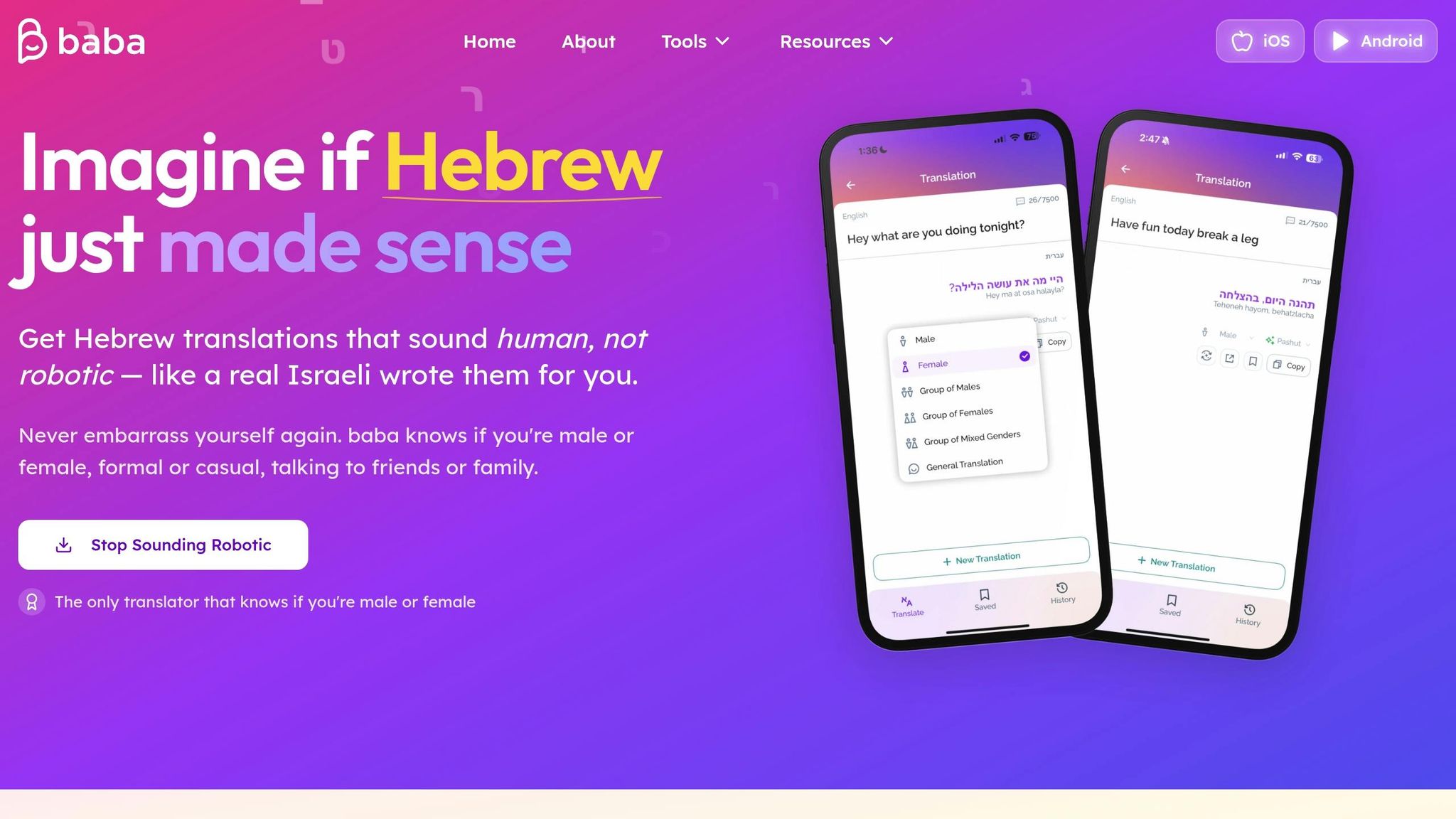
Hebrew’s grammar is famously intricate, with challenges like gender agreements, plural forms, and nuanced context that can completely shift a sentence’s meaning. Standard translation tools often struggle with these complexities. That’s where baba steps in, using AI to master Hebrew’s structure and bring clarity to communication.
The platform’s gender-aware translation ensures precision by recognizing both the speaker and the audience. For instance, when crafting business emails, baba handles everything from proper greetings to right-to-left formatting and culturally appropriate closing phrases, all while respecting Hebrew’s formal standards.
"baba is the first Hebrew translator that truly understands context, gender, and slang - finally making Hebrew communication feel natural (not robotic)." - Isaac Horowitz, Founder @ baba
Another standout feature is its plurality-sensitive approach, which adjusts verb forms depending on whether you’re addressing an individual or a group. This attention to detail ensures translations feel authentic and true to Hebrew’s unique grammatical rules.
baba also offers flexibility with multiple AI models tailored to different needs. Quick translation is ideal for casual chats, while a more detailed option provides nuanced interpretations for critical documents. Whether it’s a short text or a formal presentation, baba ensures accuracy without sacrificing the language’s integrity.
Connecting People Through Hebrew
Beyond its technical precision, baba connects people from all walks of life, making Hebrew accessible to a wide range of users with varying goals.
- Business professionals rely on it for closing deals, drafting contracts, and maintaining relationships in Tel Aviv and beyond. By respecting Hebrew’s formal tone and cultural expectations, baba ensures their communication stays polished and effective.
- Language learners gain valuable insights into Hebrew grammar as the platform highlights gender and plurality choices. Each translation becomes a mini-lesson, helping users understand the “why” behind the language’s structure.
- Cultural enthusiasts exploring Hebrew literature, religious texts, or Israeli traditions find that baba captures the emotional depth and cultural significance of the language. This makes connecting with Hebrew-speaking friends or communities more meaningful.
The platform even includes smart language detection, which automatically identifies whether you’re typing in English or Hebrew. This seamless feature encourages users to incorporate Hebrew into their daily lives, boosting confidence and fluency over time.
Get on the Waitlist
Continuing the vision of Eliezer Ben-Yehuda, baba is bringing its advanced translation capabilities to your pocket with a mobile app. Designed for everyday scenarios, the app ensures quick and accurate Hebrew communication wherever you are. Whether you’re traveling in Israel, joining a Hebrew-language video call, or helping your kids with homework, baba is there to support you.
Sign up for the waitlist at www.itsbaba.com and see how AI can make Hebrew communication easier while staying true to the traditions Ben-Yehuda worked so tirelessly to revive.
Conclusion: Ben-Yehuda's Lasting Influence
Eliezer Ben-Yehuda's vision turned Hebrew from a language confined to sacred texts into a living, national language. His efforts not only revived Hebrew but also shaped the cultural identity of a nation.
Historical records highlight the rapid shift from Hebrew being rarely spoken at home to becoming a primary language of daily life. By 1948, an impressive 80.9% of Jews born in Palestine spoke Hebrew as their main language, with another 14.2% using it as their primary language among several others. This remarkable transformation occurred because Ben-Yehuda understood that reviving a language required more than academic effort - it had to become woven into everyday life.
Ben-Yehuda’s belief in bold leadership continues to resonate. He once said:
"For everything there is needed only one wise, clever and active man, with the initiative to devote all his energies to it, and the matter will progress, all obstacles in the way notwithstanding... In every new event, every step, even the smallest in the path of progress, it is necessary that there be one pioneer who will lead the way without leaving any possibility of turning back." - Eliezer Ben-Yehuda
Today, Modern Hebrew is spoken by over 9 million people worldwide. The language continues to grow, adapting to modern times with new words for emerging concepts. Just as Ben-Yehuda introduced terms like iton (newspaper) and rakevet (train), the Hebrew Academy now adds words like merachefon (drone) and madrech (podcast). His blend of tradition and modernity echoes in today's advancements, including AI-driven tools that enhance Hebrew communication.
Key Takeaways
Ben-Yehuda’s legacy is a blueprint for linguistic innovation. His holistic approach - integrating family, education, and community - firmly established Hebrew in everyday life. By fostering Hebrew-only households and raising the first modern native Hebrew speaker, he demonstrated that even ancient languages can adapt to modern needs.
His method of creating new words, rooted in biblical texts and Semitic languages, provided a framework for Hebrew's continued evolution. He showed that honoring a language’s heritage can coexist with practical adaptation, a balance that remains vital as Hebrew evolves to meet the demands of the digital age.
More than just a tool for communication, Hebrew became a symbol of connection - linking people to their history and to one another. This community-driven approach is why Hebrew thrives today. Modern tools like baba build on Ben-Yehuda’s foundation, using AI to address the complexities of Hebrew grammar, gender agreements, and cultural nuances, helping speakers communicate with ease.
Ben-Yehuda’s transformation of Hebrew from a scholarly relic to a vibrant, spoken language laid the groundwork for today’s Hebrew renaissance. His story reminds us that revitalizing a language - or any cultural asset - requires both visionary ideas and practical dedication. These lessons continue to influence how Hebrew adapts to the modern world.
Join the waitlist for our mobile app at www.itsbaba.com
FAQs
How did Eliezer Ben-Yehuda address opposition to reviving Hebrew as a modern language?
Eliezer Ben-Yehuda faced resistance from both religious and political groups but stood firm in his belief that Hebrew could serve as a unifying force for Jewish national identity. While some traditionalists leaned toward biblical Hebrew and questioned whether it could ever be revived as a practical, spoken language, Ben-Yehuda set out to prove otherwise.
To modernize Hebrew, he created new words, drawing inspiration from biblical and rabbinical texts, ensuring the language could meet the needs of contemporary life. He championed its use in schools, everyday conversations, and public forums, tirelessly working to make it a part of daily life. Thanks to his determination, Hebrew evolved into a dynamic language that connects its rich historical roots with modern communication.
How did Eliezer Ben-Yehuda create new Hebrew words for modern concepts?
Eliezer Ben-Yehuda was instrumental in bringing Hebrew into the modern age by crafting new vocabulary to suit contemporary life. Drawing inspiration from ancient Hebrew texts, he carefully devised words that stayed true to the language's roots while meeting modern needs. His work didn’t stop there - he also created an extensive dictionary, which became a key resource for standardizing Hebrew and introducing terms for ideas and fields like technology and science that didn’t exist in biblical times.
Through his dedication, Ben-Yehuda ensured that Hebrew could flourish as a living, spoken language, seamlessly connecting its ancient heritage with the realities of modern communication.
How did Eliezer Ben-Yehuda shape the revival of Hebrew and influence its use today?
Eliezer Ben-Yehuda was instrumental in bringing Hebrew back to life as a modern spoken language. He expanded its vocabulary to suit everyday conversations and professional settings, championed its use in homes and schools, and motivated the establishment of educational programs that still teach Hebrew across the globe.
Thanks to his dedication, modern resources and tools have been built to make learning and using Hebrew easier. His influence lives on in advanced language platforms that respect Hebrew's distinct linguistic character while meeting the demands of contemporary communication.


